新概念英语第二册Lesson 6 Percy Buttons 课件(共28张PPT)
文档属性
| 名称 | 新概念英语第二册Lesson 6 Percy Buttons 课件(共28张PPT) | 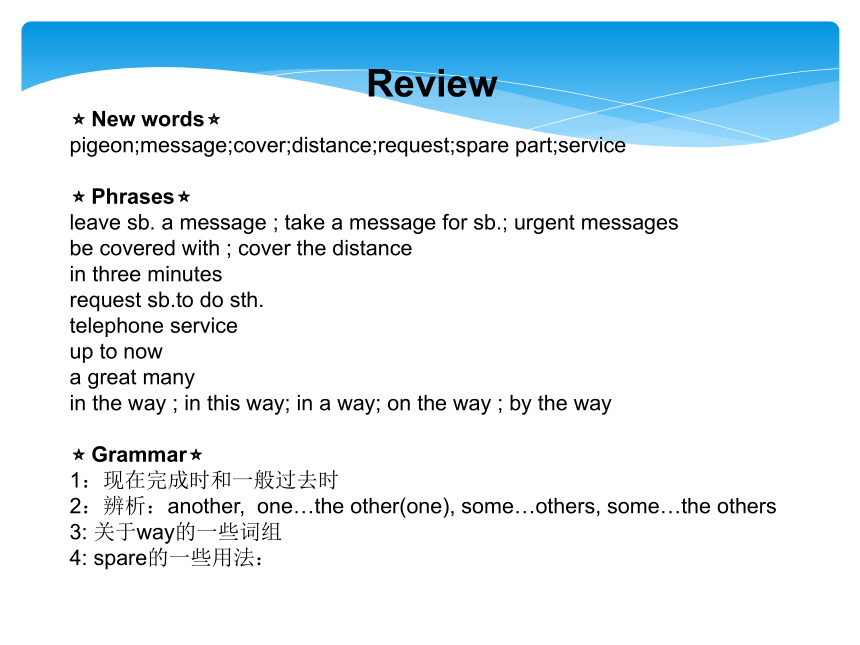 | |
| 格式 | pptx | ||
| 文件大小 | 20.4MB | ||
| 资源类型 | 教案 | ||
| 版本资源 | 新概念英语 | ||
| 科目 | 英语 | ||
| 更新时间 | 2024-07-30 09:40:19 | ||
图片预览

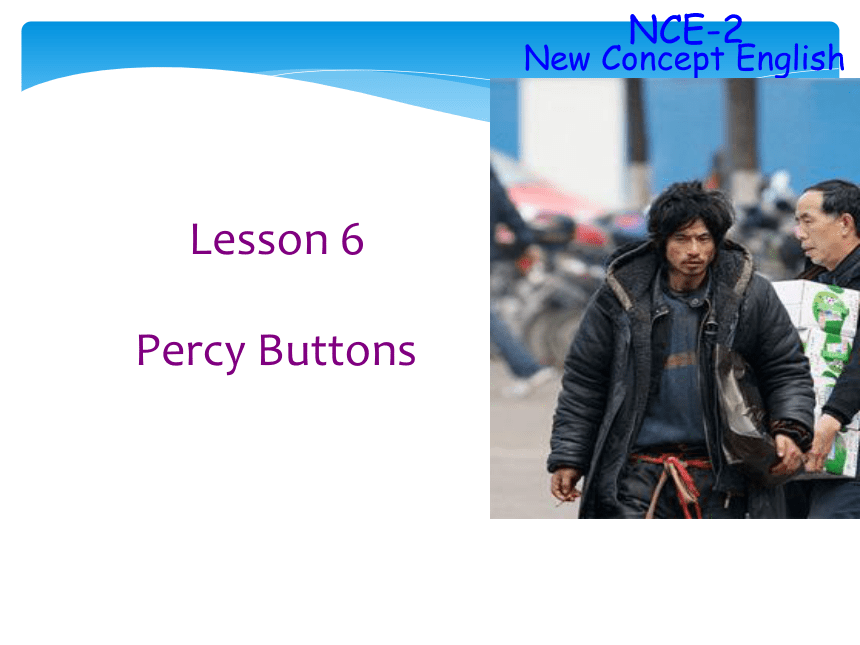
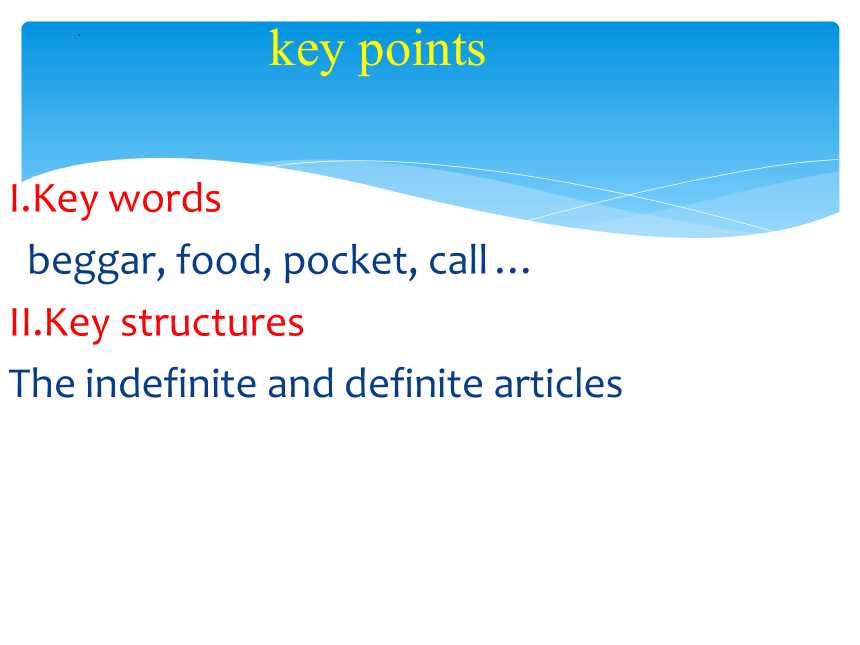
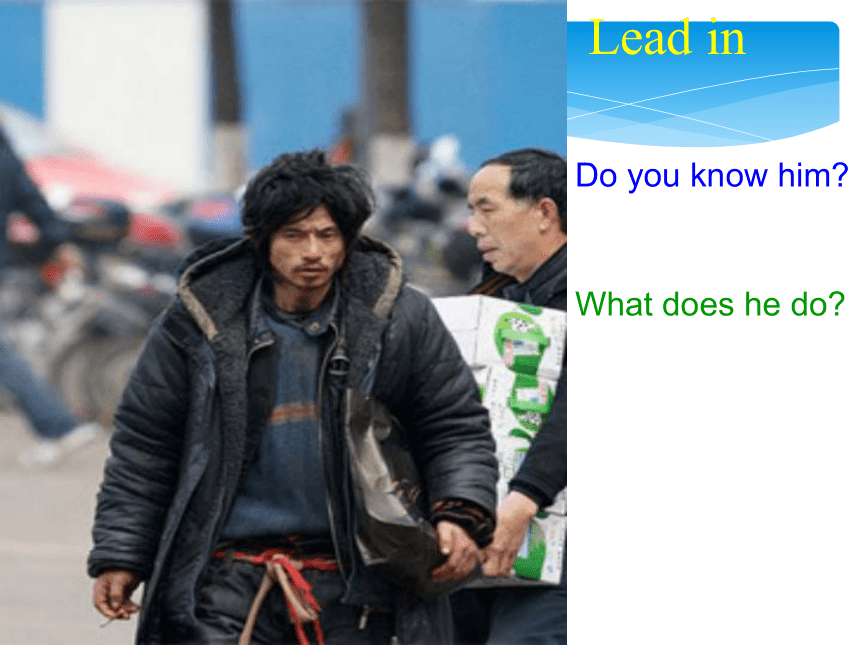
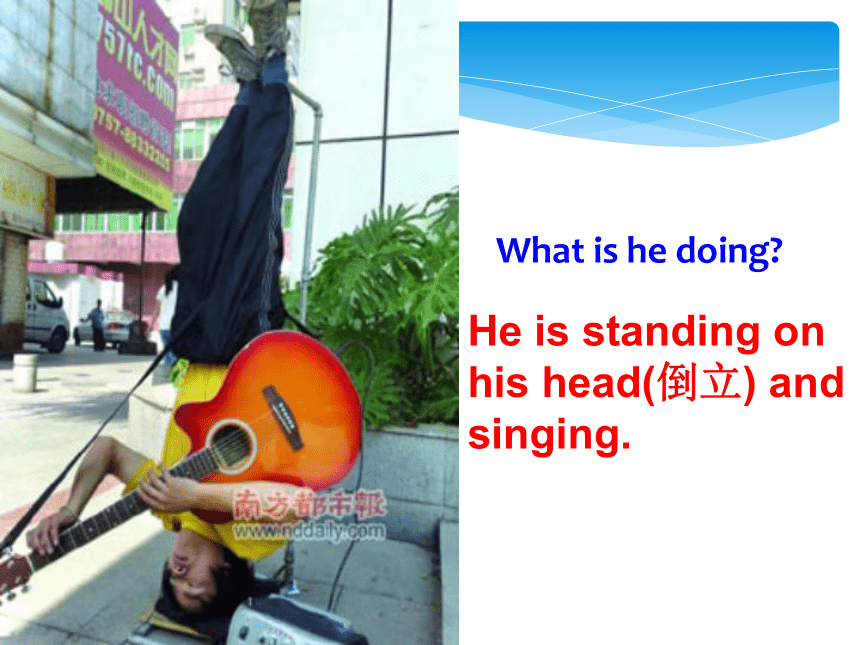
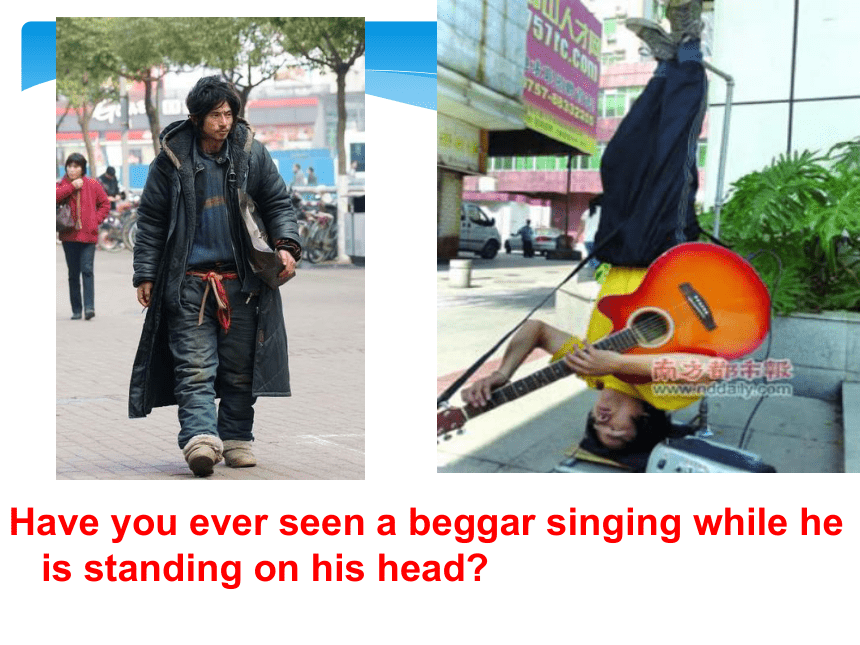
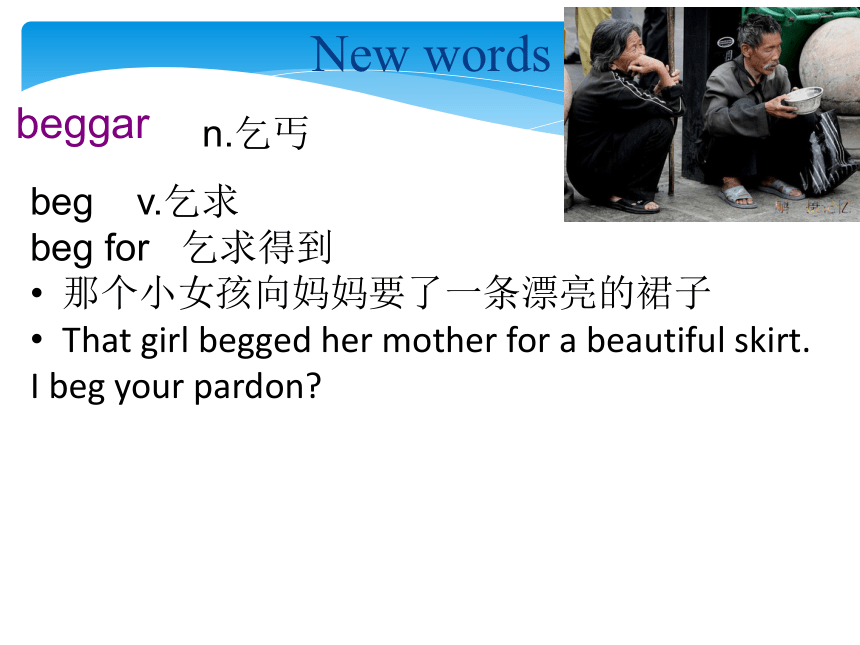
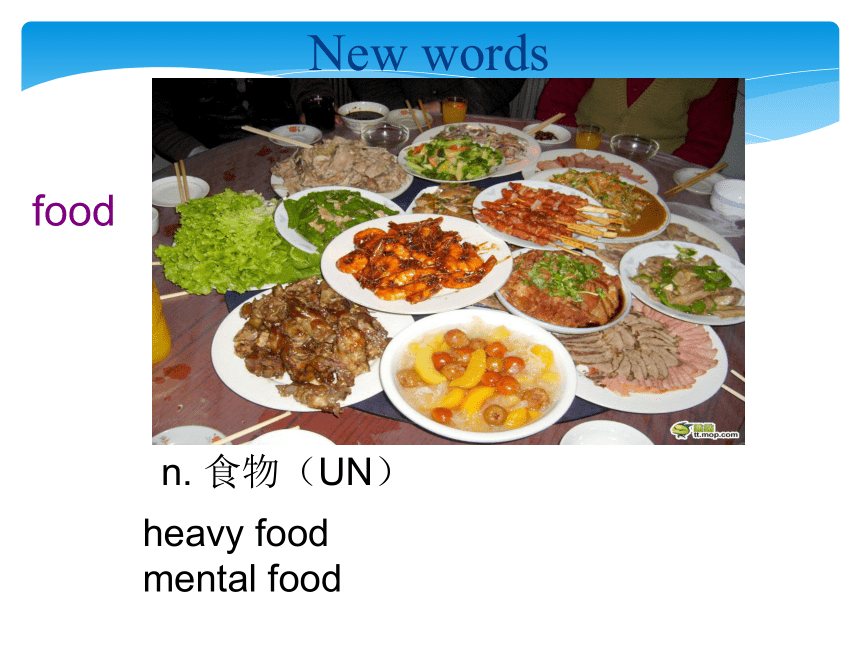
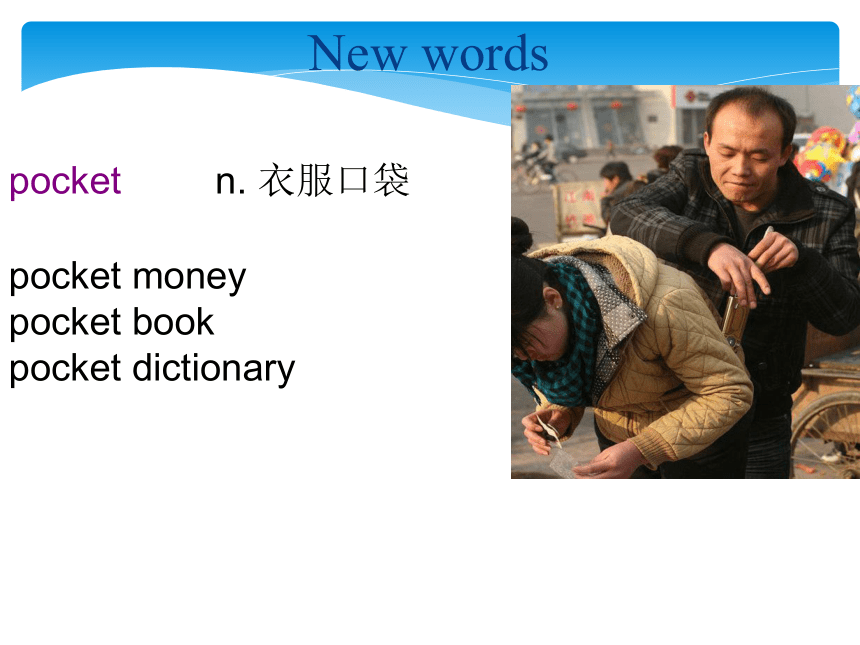
文档简介
(共28张PPT)
Review
New words
pigeon;message;cover;distance;request;spare part;service
Phrases
leave sb. a message ; take a message for sb.; urgent messages
be covered with ; cover the distance
in three minutes
request sb.to do sth.
telephone service
up to now
a great many
in the way ; in this way; in a way; on the way ; by the way
Grammar
1:现在完成时和一般过去时
2:辨析:another, one…the other(one), some…others, some…the others
3: 关于way的一些词组
4: spare的一些用法:
NCE-2
New Concept English
Lesson 6
Percy Buttons
I.Key words
beggar, food, pocket, call …
II.Key structures
The indefinite and definite articles
key points
Do you know him
What does he do
Lead in
What is he doing
He is standing on his head(倒立) and singing.
Have you ever seen a beggar singing while he is standing on his head
New words
beggar
n.乞丐
beg v.乞求
beg for 乞求得到
那个小女孩向妈妈要了一条漂亮的裙子
That girl begged her mother for a beautiful skirt.
I beg your pardon
n. 食物(UN)
heavy food
mental food
food
New words
New words
pocket
n. 衣服口袋
pocket money
pocket book
pocket dictionary
New words
call
(1) vt.&vi. 叫,喊
call out =shout
(2)v.打电话
(3)v. 拜访,光顾
call on sb /call at sp
我星期天会去拜访你。
I'll call on you on Sunday.
昨天我去布朗先生家拜访。
I called at Mr. Brown's yesterday.
Q:What can you see in
the picture
Lead in
Ⅱ.Watch the video and try to answer these questions.
Who is Percy Buttons
1.Has the writer just moved to Bridge Street
2.Who knocked at her door yesterday
3.What did he do in return for a meal and a glass of beer
4.What did the writer give him
5. Who told you about him later
New Lesson
New Lesson
Percy Buttons
I have just moved to a house in Bridge Street. Yesterday a beggar knocked at my door. He asked me for a meal and a glass of beer. In return for this, the beggar stood on his head and sang songs. I gave him a meal. He ate the food and drank the beer. Then he put a piece of cheese in his pocket and went away. Later a neighbour told me about him. Everybody knows him. His name is Percy Buttons. He calls at every house in the street once a month and always asks for a meal and a glass of beer.
III. Read the text loudly and try to decide if these sentences are True or False .
1.The beggar asked the writer for a meal and a
glass of beer. ( )
2.He put a piece of cheese in his bag and went
away. ( )
3.The beggar calls at every house in the street
once a week. ( )
4.He always asks for a meal and a glass of beer.
( )
T
F
pocket
F
month
T
Ⅴ. 回顾课文,并根据课文填空
I have just moved to___house in ___Bridge Street. Yesterday___beggar _______ __my door. He _____ me____ ___meal and___glass of beer. __ _____ ___ this, ___beggar_____ __ __ ____ and sang songs. I gave him ___meal. He ate ___food and drank___ beer. Then he put __ piece of cheese in his pocket and____ ____. Later __neighbor told me about him.Everybody knows him. His name is Percy Buttons. He____ __ every house in __street once __ month and always asks for __meal and __glass of beer.
knocked at
asked
for
In return for
stood on his head
calls at
went away
Summary
move to
knock at / off / over / out
ask (sb.) for
in return for…
stand on one’s head
a piece of cheese
go away
tell sb about sth
call at / on
once a month
Grammar
The usages of a, an, the, and some
是什么?
分类?
a, an 泛指 a man/ bus
the 特指 the man/bus
some + 不可数名词/可数名词复数
He is Lei Feng.
He is a Lei Feng.
泛指
不明确的对象
I’m hungry. I want an apple.
首次提到的对象
I saw a dog in Bridge Street yesterday.
泛指
明确的对象
I want the apple in your hand.
再次提到的对象
The dog was really cute.
定冠词( the definite article)
3) 表示世界上独一无二的事物。
the sun the moon the earth the sky the world
4) 定冠词与单数名词连用,表示这一类人或物。
The dog is a friend of our humans.
The cat is an animal.
与某些形容词连用,使形容词名词化, 表示某一类人。
the poor, the rich, the wounded, the sick, the deaf.
5) 用在序数词, 形容词最高级前。
6) 用在江河,海洋,山脉,群岛的名称之前。
7)用在姓名复数之前,表示一家人。
Practice
1_____rose is _______beautiful flower.
2. Mr. Smith always smokes ____ cigarette with a cup of coffee.
3.____door of ___garage is broken.
4. _____donkeys are stupid animals.
5. _____bread is made from ___flour, and ___flour is made from ___wheat.
Grammar 2
词本无意,意由境生
结论: put on(穿上,戴上), take off(脱掉,摘掉), look for (寻找),look after(照顾,照料)
Grammar
① knock at 敲(门、窗等)
②knock off撞掉,把...从...碰掉;(价格上)减去,除去,打折扣;下班,收工
③knocked over 碰撞,把...撞倒,撞翻
④ knock out 把(某人)打昏
Compared with them, are you happier than them And what should you do
与他们相比,你比他们更幸福吗?你应该怎么做?
不定冠词( the indefinite article)的用法:
1) 表示某一类人或某事物中的任何一个,经常用在第一次提到某人或某物时,用不定冠词起介绍作用,表示一个。
I am reading an interesting story .
There is a tree in front of my house.
2) 表示人或事物的某一种类, 强调整体, 即以其中的一个代表一类。
A horse is useful to mankind.
A bird can fly.
3) 用来指某人某物,但不具体说明任何人或任何物。
A boy came to see you a moment ago .
We need a car now.
4) 用在事物的“单位”前,如时间, 速度, 价格等意义的名词之前,表示 “每一”如”每日“”每斤“。
We often go to Wisdom School three times a week.
The potato is sold at about 5 yuan a kilogram.
Butter is 4 yuan a kilo.
He drove the car at 18 miles an hour.
The doctor told him to take the medicine 3 times a day
5)用于构成词组
a few 几个 ;a little 有点 ;a lot of;
量词词组(修饰不可数名词)
a glass of milk
a bar of soap / a cake of soap
a cup of tea
a piece of cloth / a length of cloth
a slip of paper / a piece of paper / news
a block of ice
a grain of rice
a lump of sugar
不用冠词的场合(零冠词)。
1) 专有名词,抽象名词和物质名词之前一般不用冠词.
I think water is a kind of food, too.
Cotton feels soft.
2) 表示日常餐食名词之前不用冠词,但如果指具体的饮食时用定冠词 the。
It‘s time for breakfast.
What did you have for dinner
3) 在季节,月份,星期,节日。球类运动,棋类游戏的名词之前不用冠词。
Summer is hot and winter is cold here.
Mid-Autumn Day is coming.
Today is the first day of May.
4) 某些固定词组不用冠词。
by air, on foot, at night, after school, at home, go to class, in fact, from morning till night.
5)语言的名称前不用冠词。
Can you speak English I know Russian but I don't know French.
6)在姓名、地名、国名(非复合词)不加任何冠词:
Tom is in Germany now. He studies physics in Berlin. He has a house in Bridge Street.
Review
New words
pigeon;message;cover;distance;request;spare part;service
Phrases
leave sb. a message ; take a message for sb.; urgent messages
be covered with ; cover the distance
in three minutes
request sb.to do sth.
telephone service
up to now
a great many
in the way ; in this way; in a way; on the way ; by the way
Grammar
1:现在完成时和一般过去时
2:辨析:another, one…the other(one), some…others, some…the others
3: 关于way的一些词组
4: spare的一些用法:
NCE-2
New Concept English
Lesson 6
Percy Buttons
I.Key words
beggar, food, pocket, call …
II.Key structures
The indefinite and definite articles
key points
Do you know him
What does he do
Lead in
What is he doing
He is standing on his head(倒立) and singing.
Have you ever seen a beggar singing while he is standing on his head
New words
beggar
n.乞丐
beg v.乞求
beg for 乞求得到
那个小女孩向妈妈要了一条漂亮的裙子
That girl begged her mother for a beautiful skirt.
I beg your pardon
n. 食物(UN)
heavy food
mental food
food
New words
New words
n. 衣服口袋
pocket money
pocket book
pocket dictionary
New words
call
(1) vt.&vi. 叫,喊
call out =shout
(2)v.打电话
(3)v. 拜访,光顾
call on sb /call at sp
我星期天会去拜访你。
I'll call on you on Sunday.
昨天我去布朗先生家拜访。
I called at Mr. Brown's yesterday.
Q:What can you see in
the picture
Lead in
Ⅱ.Watch the video and try to answer these questions.
Who is Percy Buttons
1.Has the writer just moved to Bridge Street
2.Who knocked at her door yesterday
3.What did he do in return for a meal and a glass of beer
4.What did the writer give him
5. Who told you about him later
New Lesson
New Lesson
Percy Buttons
I have just moved to a house in Bridge Street. Yesterday a beggar knocked at my door. He asked me for a meal and a glass of beer. In return for this, the beggar stood on his head and sang songs. I gave him a meal. He ate the food and drank the beer. Then he put a piece of cheese in his pocket and went away. Later a neighbour told me about him. Everybody knows him. His name is Percy Buttons. He calls at every house in the street once a month and always asks for a meal and a glass of beer.
III. Read the text loudly and try to decide if these sentences are True or False .
1.The beggar asked the writer for a meal and a
glass of beer. ( )
2.He put a piece of cheese in his bag and went
away. ( )
3.The beggar calls at every house in the street
once a week. ( )
4.He always asks for a meal and a glass of beer.
( )
T
F
F
month
T
Ⅴ. 回顾课文,并根据课文填空
I have just moved to___house in ___Bridge Street. Yesterday___beggar _______ __my door. He _____ me____ ___meal and___glass of beer. __ _____ ___ this, ___beggar_____ __ __ ____ and sang songs. I gave him ___meal. He ate ___food and drank___ beer. Then he put __ piece of cheese in his pocket and____ ____. Later __neighbor told me about him.Everybody knows him. His name is Percy Buttons. He____ __ every house in __street once __ month and always asks for __meal and __glass of beer.
knocked at
asked
for
In return for
stood on his head
calls at
went away
Summary
move to
knock at / off / over / out
ask (sb.) for
in return for…
stand on one’s head
a piece of cheese
go away
tell sb about sth
call at / on
once a month
Grammar
The usages of a, an, the, and some
是什么?
分类?
a, an 泛指 a man/ bus
the 特指 the man/bus
some + 不可数名词/可数名词复数
He is Lei Feng.
He is a Lei Feng.
泛指
不明确的对象
I’m hungry. I want an apple.
首次提到的对象
I saw a dog in Bridge Street yesterday.
泛指
明确的对象
I want the apple in your hand.
再次提到的对象
The dog was really cute.
定冠词( the definite article)
3) 表示世界上独一无二的事物。
the sun the moon the earth the sky the world
4) 定冠词与单数名词连用,表示这一类人或物。
The dog is a friend of our humans.
The cat is an animal.
与某些形容词连用,使形容词名词化, 表示某一类人。
the poor, the rich, the wounded, the sick, the deaf.
5) 用在序数词, 形容词最高级前。
6) 用在江河,海洋,山脉,群岛的名称之前。
7)用在姓名复数之前,表示一家人。
Practice
1_____rose is _______beautiful flower.
2. Mr. Smith always smokes ____ cigarette with a cup of coffee.
3.____door of ___garage is broken.
4. _____donkeys are stupid animals.
5. _____bread is made from ___flour, and ___flour is made from ___wheat.
Grammar 2
词本无意,意由境生
结论: put on(穿上,戴上), take off(脱掉,摘掉), look for (寻找),look after(照顾,照料)
Grammar
① knock at 敲(门、窗等)
②knock off撞掉,把...从...碰掉;(价格上)减去,除去,打折扣;下班,收工
③knocked over 碰撞,把...撞倒,撞翻
④ knock out 把(某人)打昏
Compared with them, are you happier than them And what should you do
与他们相比,你比他们更幸福吗?你应该怎么做?
不定冠词( the indefinite article)的用法:
1) 表示某一类人或某事物中的任何一个,经常用在第一次提到某人或某物时,用不定冠词起介绍作用,表示一个。
I am reading an interesting story .
There is a tree in front of my house.
2) 表示人或事物的某一种类, 强调整体, 即以其中的一个代表一类。
A horse is useful to mankind.
A bird can fly.
3) 用来指某人某物,但不具体说明任何人或任何物。
A boy came to see you a moment ago .
We need a car now.
4) 用在事物的“单位”前,如时间, 速度, 价格等意义的名词之前,表示 “每一”如”每日“”每斤“。
We often go to Wisdom School three times a week.
The potato is sold at about 5 yuan a kilogram.
Butter is 4 yuan a kilo.
He drove the car at 18 miles an hour.
The doctor told him to take the medicine 3 times a day
5)用于构成词组
a few 几个 ;a little 有点 ;a lot of;
量词词组(修饰不可数名词)
a glass of milk
a bar of soap / a cake of soap
a cup of tea
a piece of cloth / a length of cloth
a slip of paper / a piece of paper / news
a block of ice
a grain of rice
a lump of sugar
不用冠词的场合(零冠词)。
1) 专有名词,抽象名词和物质名词之前一般不用冠词.
I think water is a kind of food, too.
Cotton feels soft.
2) 表示日常餐食名词之前不用冠词,但如果指具体的饮食时用定冠词 the。
It‘s time for breakfast.
What did you have for dinner
3) 在季节,月份,星期,节日。球类运动,棋类游戏的名词之前不用冠词。
Summer is hot and winter is cold here.
Mid-Autumn Day is coming.
Today is the first day of May.
4) 某些固定词组不用冠词。
by air, on foot, at night, after school, at home, go to class, in fact, from morning till night.
5)语言的名称前不用冠词。
Can you speak English I know Russian but I don't know French.
6)在姓名、地名、国名(非复合词)不加任何冠词:
Tom is in Germany now. He studies physics in Berlin. He has a house in Bridge Street.
同课章节目录
